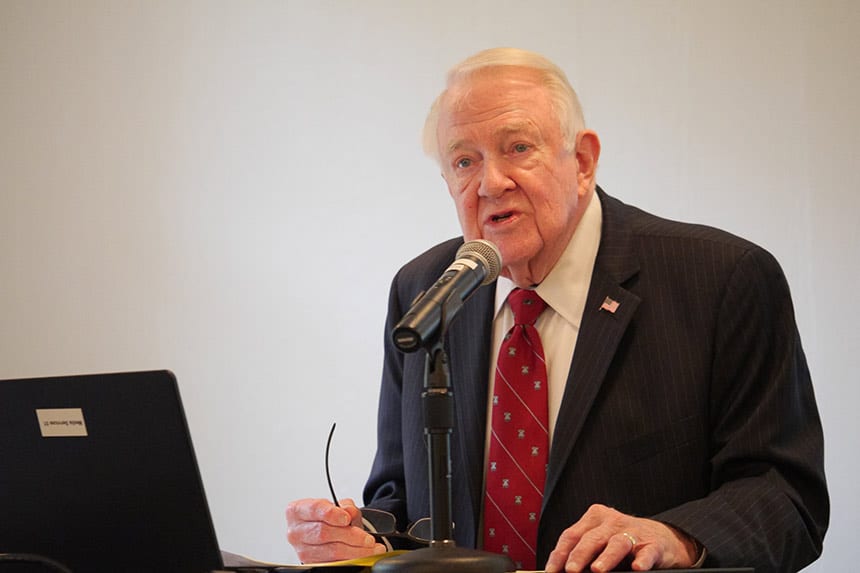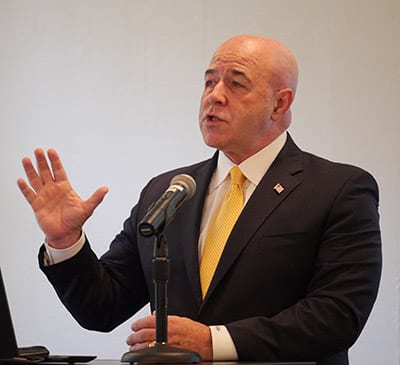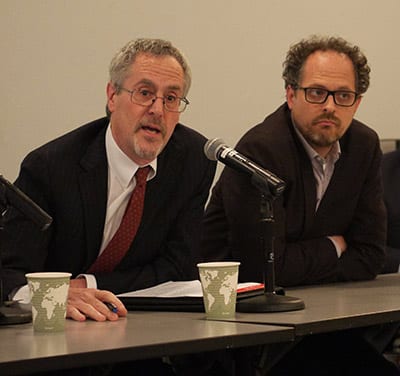
By Andrew Cohen
It was a welcome and all too rare sight: experts from opposite sides of the political spectrum debating a vital domestic issue constructively and civilly. At a recent daylong conference co-sponsored by Berkeley Law and the Heritage Foundation, they probed the United States’ criminal justice system—from police tactics and the rise in violent crime to surveillance and marijuana legislation.
In his opening overview, Dean Erwin Chemerinsky noted that the United States has 4 percent of the world’s population but 22 percent of its prisoners. He said the conference’s focus on policing “could not be more timely,” and that “every study shows how a black or brown person is more likely to get stopped than a white person, more likely to be arrested, and more likely to be charged with a longer sentence.”
Chemerinsky chaired a Los Angeles commission from 1997-1999 tasked with revising the city charter on how to govern the city’s police department. In 2000, he prepared a detailed report for which his team interviewed nearly 100 officers. “I learned a lot about policing in a major city; and a major problem in the department was its culture,” Chemerinsky said—one that he was told “exalted Dirty Harry and shunned Serpico.”
Audience members heard a different viewpoint after the dean introduced former U.S. Attorney General Edwin Meese ’58. Now a Heritage Foundation senior fellow, Meese noted that the U.S. has the world’s most complex criminal justice apparatus, with roughly 18,000 police agencies and 3,300 prosecutorial agencies. He disagreed with the dean’s view about the scope of necessary reform.
“More than half of our police agencies are manned by fewer than 10 officers, and 75 percent of them have fewer than 25,” he said. “Most areas don’t have the situation noted by the dean, but instead have much more constructive relationships. In many areas, reforms aren’t needed. It’s important to recognize that the instances where police act in an improper way is a miniscule portion of police contact with the public.”
Meese expressed gratitude for an event that provided “a broad view of a series of problems that face the criminal justice community. Calling it ‘the criminal justice system’ is awfully charitable—there’s really no system.”
On both sides of the law

Opening keynote speaker Bernard Kerik, former New York commissioner of corrections and New York City commissioner of police, offered a first-hand view from both sides of the system. In 2010, he was sentenced to four years in prison after pleading guilty to federal charges including tax fraud and false statements.
“I’ve been a military police officer, a cop, a New York City detective, a corrections officer, a warden of a county jail, and a police commissioner,” he said. “I thought I knew the criminal justice system better than anyone around until I walked into a federal prison camp. I thought it was filled with bad guys who do bad things, but that’s not true.”
Kerik described fellow inmates who hardly fit the criminal stereotype: A commercial fisherman jailed for catching too many fish. A young man convicted for mortgage fraud and money laundering after a broker encouraged him to inflate his income on a mortgage application. A Marine incarcerated for selling a pair of night vision goggles—which he owned legally—on EBay to someone overseas who used them illegally.
“Instead of suspending the fisherman’s license, we turn him into a convicted felon,” Kerik said. “He can never get a fishing license again, his wife went on public assistance, and six guys on his boat lost their jobs. That kid who walked in as a Marine, his prison boots were so shiny you could see your face in them. Khakis starched. ‘Yes sir, no sir’ to everyone. But he left a thug. We took a U.S. Marine and turned him into a little monster. Is that what the criminal justice system is supposed to do?”
Kerik cited productive working relationships between city leaders and police as essential to success. He pointed to Chicago, which had more homicides last year than New York City and Los Angeles combined, as a city in need of stronger oversight.
“When I became a New York cop in 1986, Time magazine called New York City the rotten apple and said it was too big to control,” Kerik recalled. “We took one of the most violent cities in America and turned it into one of the safest by giving law enforcement the tools and resources we needed to the do the job. If police don’t have the right leadership in place, that job won’t get done.”
Police violence
The conference explored recent allegations leveled at police departments for systemic racism and civil rights violations. While some panelists said that such critiques drive essential improvements in training and transparency, others warned that they also fuel an anti-cop narrative that stokes mistrust of and attacks on police.
Ron Hosko, former assistant director of the FBI, expressed concern about back-to-back years of increased violent crime and homicide rates after two decades of steady decline. He linked the rise in attacks on law enforcement with declining rates of police hiring, increased retirements at the earliest possible age, and “failing to invest in local law enforcement.”
While Hosko lamented attacks on police, Berkeley Law Professor Franklin Zimring discussed how to reduce the number of civilians—roughly 1,100—killed by police in the U.S. each year. “That’s about twice as many as we need to experience to protect officers from life-threatening assaults,” he said. “The reason is that in 45 percent of those killings, the weapon involved or present was not a firearm.”

Citing poor training as a large part of the problem, Zimring recommended research-driven rules on police uses of firearms. Noting that few departments can afford such studies, he said the federal government is where “facts, research, and policy initiatives have to be evaluated and pushed forward.” Zimring cited the positive impact of such training in Philadelphia, which he said went from the highest rate of killings by police among 14 major cities to the second lowest in two years.
Community policing
Arif Alikhan, who directs the Los Angeles Police Department’s Office of Constitutional Policing & Policy, credited a non-insular approach for helping that city improve its practices and results. Conversely, he said a lack of time and resources deters more positive interactions with the community.
“It’s hard to talk to people if you’re racing from call to call dealing with high-level situations,” Alikhan explained. “When police can talk to kids, stop by stores, or visit schools, that enhances public trust. But how much time do cities give for officers to do that?”
Berkeley Law Professor Jonathan Simon ’87 provided some historical context regarding policing and race. He explained how our modern policing template was born in 1820s London, where officers focused on “rabble management” in addition to theft in a new commodity-driven world.
“Police have a long, institutional relationship with communities of color independent of law,” Simon said. “Demographic growth and rising immigration drove a lot of anxiety, and immigrants considered non-white and non-Christian were deemed ungovernable … Over time we doubled down on these strategies with communities of color, assuming that they’re backward and a prime source of crime.”
Routes to reform
Other panels examined the intersection of technology and criminal justice, the marijuana legalization debate, and the future of criminal justice reform—including reworking asset forfeiture and shifting prosecutors’ focus away from low-level drug offenders to help reduce mass incarceration.
Berkeley Law Professor Charles Weisselberg touted the promise of reforms at the local and state level. One example highlighted the Policy Advocacy Clinic, whose research led to the abolishment of regressive juvenile justice system fees in several counties and the recent passage of a bill abolishing such fees statewide. “It’s an example of research-based reform from the ground up,” Weisselberg said.
He also mentioned Senate Bill 395, which requires juveniles 15 and under to consult with counsel during a custodial interrogation.
“This is a state-led reform, not looking to the federal government for leadership,” said Weisselberg, who posed “whether it might promote some rethinking of interrogation practices, with lessons for the questioning of older juveniles and adults.”